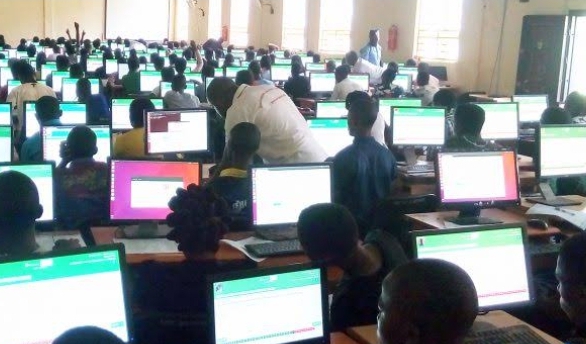Tuesday June 3, 2025|
The Minister of State for Education, Professor Suwaiba Ahmad, has promised that no student, whether in rural or urban areas, will be excluded from the government’s planned transition to Computer-Based Testing (CBT).
She gave the assurance on Tuesday, June 3, while monitoring the ongoing West African Senior School Certificate Examination (WASSCE) in selected schools across Abuja.
“We will not roll out CBT in a way that excludes any student. Every child will have the opportunity to write their examination, regardless of location or infrastructure,” she said.
“Nigerians should bear with us. We are taking all concerns seriously, and by the time CBT is fully rolled out, no child will be put at disadvantage,” she added.
The minister acknowledged the challenges ahead, especially with infrastructure and logistics, but stressed the potential benefits of CBT, including improved efficiency and integrity in the examination process.
“From my interaction with the students, they are happy with the CBT examination and actually show preference for it over the written method,” she noted.
According to her, a visit to a CBT centre showed everything was orderly and timely, unlike at a paper-based centre where the exam was delayed due to rain and scripts were unavailable.
“These are the kinds of issues CBT is designed to eliminate. CBT will ensure students are given their full allotted exam time since the system begins counting only when the student accesses the questions,” she explained.
Ahmad further pointed out that CBT could play a critical role in curbing exam malpractice.
“We know how students and schools manipulate the system, but CBT will shut those doors,” she said. “With individualised sets of questions for each candidate, impersonation, question leaks, and systemic answer sharing would be drastically reduced.”
However, she admitted that the shift to CBT would not be without challenges, particularly in remote areas where access to power and internet remains unreliable.
She said WAEC and NECO were collaborating with JAMB and other education stakeholders to overcome those barriers.
“When we roll out the CBT examination, we are going to make use of existing JAMB centres. We are not going to make use of school centres, since as you rightly mentioned, there are schools in the rural locations that don’t have light,” she explained.
“This school we are currently inspecting has no power in the exam hall. If CBT were being conducted here today, that would pose a serious challenge,” she noted.
“So all these are being considered and we are carefully planning to ensure that really when we embark on this CBT, no student is at a disadvantage,” she stressed.
Related posts
Categories
- Advertisements (1)
- Agriculture (45)
- Breaking News (26)
- Business (598)
- Crime (989)
- Education (319)
- Entertainment (128)
- Features (13)
- For The Records (43)
- Foreign News (1,189)
- Health (219)
- Home News (332)
- Interview (9)
- Judiciary (349)
- Lifestyle (140)
- Local News (111)
- National News (1,448)
- Opinion (26)
- Politics (1,012)
- Religion (157)
- Science and Technology (125)
- Security (680)
- Sports (880)
- States' News (819)
- Transportation (330)
- Uncategorized (10)

